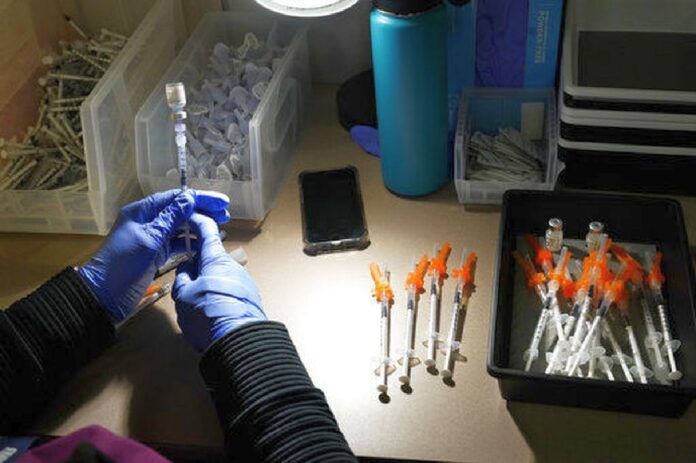
Columbus Regional Health, as well as state health officials, are concerned about what they say could be the start of another wave of COVID-19 in Indiana, with cases and hospitalizations rising as the ultra-contagious delta variant continues to increase across much of the country.
Earlier this week, CRH officials said they have started seeing local COVID-19 cases and hospitalizations trend up, reaching levels not seen in weeks.
Hospitalizations at CRH generally were hovering between none to three over the past several weeks, but ticked up to five on Tuesday for the first time since early June.
Additionally, 45 cases of COVID-19 were reported in Bartholomew County from Sunday through Thursday, up from five cases reported during the same period in the prior week.
Statewide, hospitalizations have shot up from 417 to 755 since July 1 and just over 5,000 confirmed cases were reported in Indiana from Monday to Thursday — roughly matching the number of all cases reported in the state during a 21-day period from June 19 to July 9.
The upward trends have prompted the CRH to ramp up its incident command and ensure it has the staffing, personal protective equipment and other supplies it needs in the event of another surge, said hospital spokeswoman Kelsey DeClue.
On top of that, CRH has seen a higher-than-normal inpatient census over roughly the past month that is not directly related to COVID-19, which has raised concerns that an eventual surge in coronavirus patients, if large enough, could strain hospital resources.
Currently, CRH does not anticipate any issues with equipment, supplies or staffing.
“We see a surge coming,” DeClue said, adding that CRH officials believe that vaccinations, particularly among the elderly and others thought to be more susceptible to severe illness, will help blunt a potential new wave of infections and hospitalizations.
“Do we think we’re going to see the numbers we saw back in the late fall through winter? My goodness, I hope not,” DeClue said. “We all hope not, and we don’t think we are. But there is definitely a trend that we’re seeing that (cases and hospitalizations) are slowly beginning to tick up again.”
The concerns from local health officials come just days after the Centers for Disease Control and Prevention reversed course on some masking guidelines, recommending that vaccinated people return to wearing masks indoors in parts of the U.S. where the coronavirus is surging.
Citing new information about the ability of the delta variant to spread among vaccinated people, the CDC on Tuesday also recommended indoor masks for all teachers, staff, students and visitors to schools, regardless of vaccination status.
In a news briefing Tuesday, CDC Director Dr. Rochelle Walensky said fully vaccinated people in areas of the country with a weekly transmission rate of at least 50 cases per 100,000 people should wear masks in public indoor settings.
The delta variant, which was initially detected in India, has become the dominant strain of the coronavirus that causes COVID-19 in the U.S., accounting for over 90% of sequenced viral samples in Indiana in July.
Leaked internal documents from the CDC suggest that the delta variant is more contagious than the common cold, smallpox and the Ebola virus, and it is as infectious as chickenpox, The Associated Press reported.
Earlier this month, local health officials confirmed that there have been cases of the delta variant in Bartholomew County.
“I definitely support the updated guidance from the CDC,” said Dr. Brian Niedbalski, Bartholomew County health officer. “Unfortunately, areas with low vaccination rates are seeing the highest rates of cases and transmission of the delta variant.”
Bartholomew County could become a high-risk area for transmission due to “our low county vaccination rate and especially the lower rates of surrounding counties,” Niedbalski said.
Currently, COVID-19 cases are surging in several counties in other parts of the country that have roughly the same or higher vaccination rates than Bartholomew County, according to a COVID-19 case tracker by The New York Times.
For example, St. Johns County, Florida, where 53% of the total population is fully vaccinated, had a seven-day transmission rate of 483.24 cases per 100,000 residents as of Friday afternoon, up from between 5 to 15 cases per 100,000 people in early June, according to the CDC.
By comparison, around 48% of Bartholomew County’s total population was fully vaccinated as of Friday morning, state records show.
Bartholomew County was listed as having a seven-day transmission rate of 69.23 cases per 100,000 residents, up from less than 1 case per 100,000 residents in late June, according to CDC records as of press time Friday.
State health officials on Friday urged Hoosiers to adhere to the new CDC guidance that vaccinated people return to wearing masks where COVID-19 is surging and all students, teachers and staff wear masks at schools regardless of the level of community transmission.
“Until we increase our vaccination rates and unless we use every tool available to us to stop the spread of disease, this virus will continue to have the advantage,” said state health commissioner Dr. Kristina Box during a press briefing. “It will continue to mutate and we will constantly be playing whack-a-mole for the foreseeable future.”
Locally, the COVID-19 Community Task Force plans to meet this week to “do a status check” and “talk about the big picture and things we need to keep on the radar,” DeClue said.
The task force, which was formed in February 2020, includes representatives from Columbus Regional Health, the Columbus mayor’s office, Bartholomew County Health Department, Bartholomew County Emergency Management, Bartholomew Consolidated School Corp. and Cummins Inc.
Currently, there are no plans to reinstate a local mask mandate, Niedbalski said.
However, earlier this week, Niedbalski recommended that the elderly, those with weakened immune systems and others who are at a high risk of severe COVID-19 wear masks in public indoor places whether they have been fully vaccinated or not.
Additionally, those who have not been vaccinated against COVID-19 should wear masks in indoor public places and even those who have been fully vaccinated and aren’t considered to be at a high risk of severe illness should consider wearing masks in crowded indoor places, Niedbalski said.
How the recent increase in cases will play out locally remains to be seen, particularly with evidence suggesting that younger people may be more susceptible to contracting the delta variant than other strains, CRH officials said.
“We’re still fairly new into this newer variant … of the virus making its way through the community and the area,” DeClue said. “We know it takes some time to really see the impact of that, and so we may start to see (an increase in younger people hospitalized with COVID-19) because that is a particularly less vaccinated group.”
“I think another concern is we understand people are even more fatigued,” DeClue added.
“We’ve had this window of a little break and normalcy, and it’s really, really hard to think about reversing any of that.”




